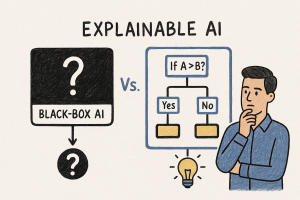Why does the success of any AI project depend not on the power of its engine, but on the quality of the fuel that powers it?
In the age of automation, it’s easy to think that the most advanced algorithm guarantees success. The reality, however, is much simpler: the true driver of performance is the raw material. Without high-quality data, even the most sophisticated AI will fail, confirming the fundamental principle: “Garbage In, Garbage Out”.
The High Cost of Ignoring Data Quality
Ignoring data quality isn’t an abstract problem; it has direct financial and operational consequences:
-
High Failure Rates: Over 80% of AI projects fail to reach production or generate the expected ROI due to data-related problems.
-
Wasted Investment: A striking 78% of companies fail to maximise their AI investment, finding their innovation hampered by a poor database.
-
Disappointing Accuracy: AI models only achieve their desired accuracy in 32% of cases, highlighting that data is the biggest obstacle to achieving reliable results.
-
Direct Multi-Million Dollar Costs: Gartner estimates that poor data quality costs organisations an average of $15 million per year.
When Data Lies: The 4 Cardinal Sins
An AI model is a mirror of its data. If the data is poor, the result will be ineffective at best, and detrimental at worst.
| The Data Sin | Direct Business Impact |
| Omission (Incomplete Data) | A sales forecasting model without data from the last quarter generates useless predictions that cannot be trusted. |
| Falsehood (Incorrect Data) | A customer service AI using a database full of incorrect emails or phone numbers will only frustrate and drive away customers. |
| Chaos (Duplicate Data) | If the same customer exists multiple times in the system, a 360º view is impossible, making marketing actions inefficient. |
| Bias (Biased Data) | A model trained on unrepresentative data (e.g., with gender or geographical bias) perpetuates unfairness, creating serious legal and reputational risks. |
The Solution: From Confusion to Strategic Governance
The foundation for an efficient and accurate AI is Data Governance. This strategic framework ensures your data is always:
-
Accurate: It reflects reality.
-
Complete: It has no critical gaps.
-
Consistent: It is standardised across all systems.
-
Relevant: It is appropriate for the problem being solved.
-
Current: It is recent enough to be useful.
Your Competitive Advantage: The Unique Digital Footprint
Any company can use the same algorithms, but no one has your data. Your historical records and customer interactions are your true competitive advantage. By feeding the AI with this quality data, a virtuous circle is created: the AI optimises processes and, in return, generates better insights that further enrich your company’s strategy.
Clara Nux: Your Data Specialist
Implementing data governance is a massive, ongoing task. This is where intelligent automation becomes essential. Clara Nux, our digital worker, is designed to be the guardian of your data quality, ensuring your team always works with reliable information.
-
Normalisation and Verification: Clara Nux cleans and standardises the information in your database, validating it against public sources to ensure consistency.
-
Task Automation (RPA): It handles repetitive data management tasks, such as data entry into your CRM, eliminating human error and maximising efficiency.
-
Intelligent Enrichment: It identifies high-value leads, enriches your CRM with verified and updated contact information, and updates their profiles.
-
Proactive Identification: It connects with key decision-makers in your target accounts, ensuring sales efforts are directed at the right people.
By delegating these tasks to Clara Nux, your team is freed up to focus on strategy and decision-making, confident that their data foundations are solid, accurate, and reliable.




